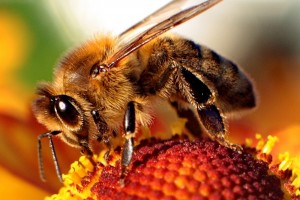Beekeepers and grain farmers at odds over government announcement

Grain farmers are not happy with the province’s announcement that it’s set a goal of reducing the use of neonicotinoid pesticides. Beekeepers are voicing approval.
By Greg Murphy
BELLEVILLE – Grain farmers in Ontario say they aren’t happy with an announcement from the Ontario government this week to reduce the use of neonicotinoid pesticides by 80 per cent by 2017 to protect bee populations. But beekeepers are saluting the government’s action.
The announcement comes amid growing evidence the substances are responsible for drastic reductions in bee population, said the ministry in a news release.
Barry Senft, CEO of Grain Farmers of Ontario (GFO), says he’s disappointed in the announcement. He said 95 per cent of corn seeds and 60 per cent of soybean seeds are treated with neonicotinoid pesticides.
“It is a very useful tool for farmers to grow those commodities. It is used quite extensively,” Senft said.
A recent report from Health Canada’s Pest Management Regulatory Agency (PMRA) found that thanks to new cautionary measures when using pesticides, bee deaths during the planting of corn and soybean seeds treated with neonicotinoids have been reduced by 70 per cent between this year and last.
In response to reported bee mortality rates across the province in 2012 and 2013, Health Canada implemented mitigation measures for grain farmers to follow when using neonicotinoids. These measures included changing the form of the substance itself to a wax based fluency agent to reduce dust being thrown into the air when planting treated seeds, and introducing warning and direction labels on pesticide and seed packaging on how to protect bees.
Senft says the GFO has also worked with the provincial government in finding ways to reduce the effect neonicotinoids have on bees.
“We’ve had a discussion over the past two years about how we can minimize the risk of affecting bee health. We are not quite clear on what effect neonicotinoids really have of bee health, but like we say, we still want to minimize that risk.”
Senft said, taking away these pesticides will have a drastic effect on crop yields and therefore the farmers’ livelihoods.
“This is an issue especially in times of price declines we are facing in comparison to the last five or six years. That extra yield is extremely important to farmers,” he said.
But Gavin North, co-proprietor of Honey Pie Hives and Herbals in Prince Edward County, says he’s pleased the provincial government is setting a goal of reducing the use of bee killing pesticides across the province.
“I think it’s a really positive step in the right direction,” said North. “It’s taken a little while but this Liberal government has been pretty cooperative so far.”
Jim Coneybeare, a vice president of the Ontario Beekeepers Association, said beekeepers across the province first noticed their bee colonies suffering heavy losses in winter and other problematic behaviours in 2007. Initially, beekeepers didn’t realize their bees were dying because of pesticide use. It wasn’t until 2012, when samples taken from dead bees, that beekeepers, in conjunction with the PMRA, realized neonicotinoid residue was responsible.
“I’ll take every opportunity to congratulate the Ontario government for taking a stand, for having a concern for pollinator health. We appreciate their position on this,” said Coneybeare.
Neonicotinoid use has given beekeepers grief for quite some time.
Coneybeare said, neonicotinoids are absorbed by plants, leaving residue on the leaves, pollen and nectar. He added the pesticide can stay in the soil for years, continuously building contamination levels. Also, Coneybeare said neonicotinoids are water-soluble – if it gets into the water system, it can be dissolved and absorbed into other plants.
“It could be sitting in a puddle. When the honey bees come by and pick up the water, they’ll get exposed. There are many levels on which a honey bee can be exposed to these harmful substances.
“This is something we’ve needed to address, the situation of our honey bee health. But it wasn’t just bees being affected, but other pollinators as well. We are quite pleased for having the government’s support for this decision.”
 Print This Post
Print This Post






